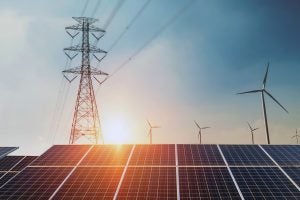A stronger CEJA will help combat dirty fuel and dirty money
 We have written on many occasions about the need for the Clean Energy Jobs Act (HB3624/SB2132). This legislation — widely considered to be the boldest climate bill currently pending in any state — empowers communities and protects the environment and consumers’ pocketbooks.
We have written on many occasions about the need for the Clean Energy Jobs Act (HB3624/SB2132). This legislation — widely considered to be the boldest climate bill currently pending in any state — empowers communities and protects the environment and consumers’ pocketbooks.
The bill was worthy of passage the moment it was introduced in February 2019. Since then, it has become even more evident that the bill should be adopted, especially in the wake of COVID-19. CEJA would have an enormous impact on the job market at a time of high unemployment, and it will generate billions of dollars in state and local tax revenue at a time when these dollars are desperately needed.
With this much going for it, promoters of CEJA would have been easily justified in leaving the bill as is. This is especially true given that it enjoys overwhelming public support, with 82% of Illinoisans backing the bill in a recent poll.
But, rather than stand pat, advocates have continued to refine and improve CEJA. Recently, new legislative language was unveiled that strengthens it in several key areas. For example, the bill now includes a new Equity Points System for companies seeking renewable energy, energy efficiency and electric vehicle contracts, and will require companies to commit to equity in hiring, ownership, subcontracting, pay and community involvement. This will ensure that the economic benefits of CEJA are shared in communities across the state.
A stronger CEJA will help combat dirty fuel and dirty money Share on XAnother critical area where we have worked to improve the bill is by adding language addressing the issue of “utility accountability.” Recent developments show the desperate need for a new, enforceable system of checks and balances on these big companies.
Like people around the state, we have been outraged by revelations of a multi-year, multi-million dollar scheme undertaken by utility giant ComEd to influence Illinois lawmakers through bribery and other illegal and unethical activities. Utilities are supposed to serve the people, but for too long it’s been the other way around in Illinois. Utilities and polluters have often dominated Illinois energy policies and customers have paid the price. It’s time to change that dynamic and implement much-needed reforms that will protect consumers and the public interest.
CEJA reforms our regulatory system to ensure that electric utilities truly serve the public interest, operate transparently and are held accountable to Illinois customers and communities. Specifically, CEJA calls for:
- Ending formula rate increases. Instead of a process that has resulted in nearly automatic rate increases, approved with little debate or oversight, CEJA would direct the Illinois Commerce Commission to only approve utility investments, programs and rates that are cost-effective and contribute to a cleaner, more equitable and more reliable electric grid.
- Replacing Illinois’ outdated approach to utility regulation with Integrated Grid Planning. In the past, the utilities would come to the ICC and tell them how they wanted to reshape the grid. CEJA flips that dynamic, by calling for a holistic, customer-focused, long-term planning process that coordinates investments in clean energy, efficiency and electrification.
- Requiring utilities to pursue goals like affordability and equity and getting rid of utility incentive to make more profit simply by spending more customer money. This way, utilities only increase profits when they achieve state goals.
- Increasing diverse public participation in utility planning, requiring performance goals to be based on public input and including resources for community groups to participate in utility planning processes.
- Prohibiting the use of ratepayer funds for expenses related to federal investigations or ethics compliance.
- Going beyond the ‘self policing’ ethics requirements set forth in the ComEd deferred prosecution agreement by creating an independent monitor to ensure ethics compliance within all utilities.
- Providing restitution for ratepayers by requiring ComEd’s shareholders to repurpose their ill-gained profits for programs that benefit communities that need resources most.
With this new language, CEJA has the potential to not only clean Illinois’ climate, but reform a cynical political climate that for too long has characterized the state.
Long before these revelations emerged, Gov. Pritzker said that he was, “not going to sign an energy bill written by the utility companies.” CEJA was drafted as the result of more than one hundred public meetings held around the state during which the public — not utility company lobbyists — had the chance to share what they wanted to see in Illinois’ energy future.
For too long, Illinois has suffered from a system that not only results in dirty air, but also dirty money influencing our politics. If lawmakers are serious about showing that they oppose this kind of “business as usual,” it is urgent that they pass the Clean Energy Jobs Act.











